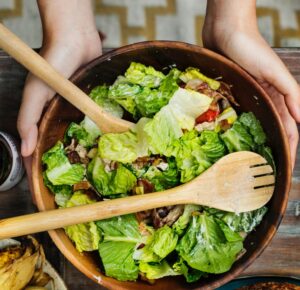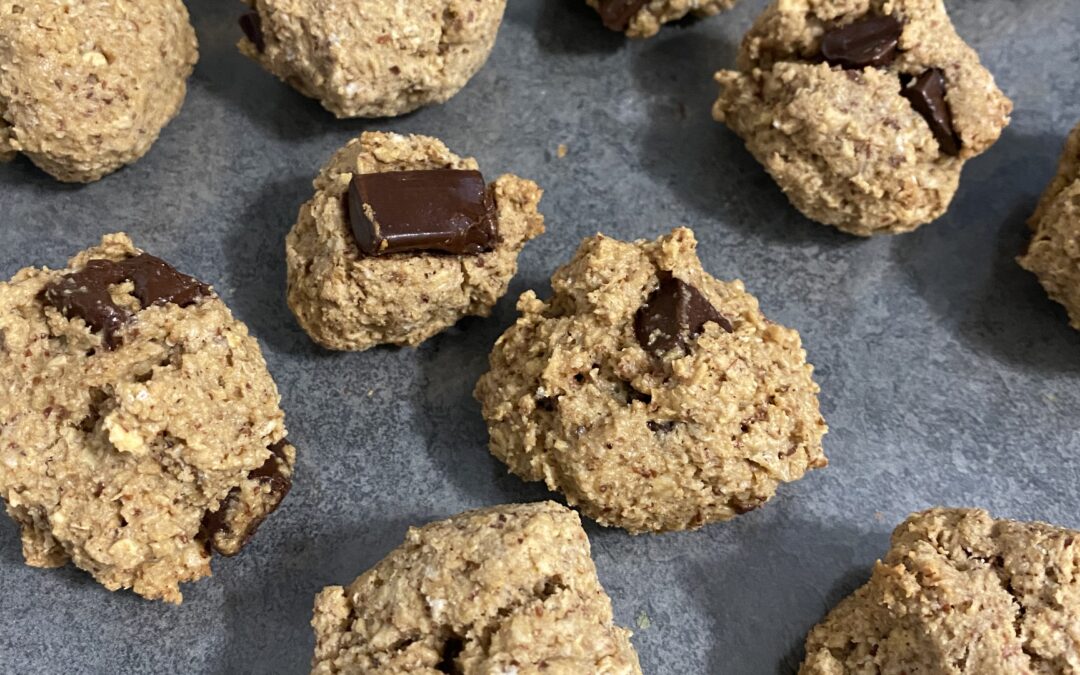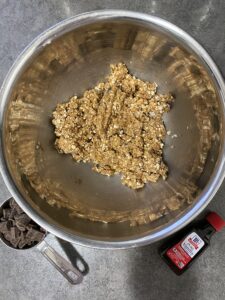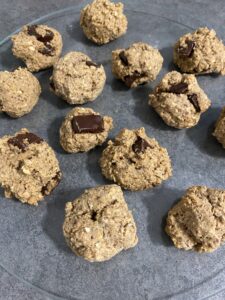
Micronutrients | Vitamins & Minerals
Micronutrients include vitamins and minerals. Vitamins are necessary for energy production, immunity and blood clotting. Minerals help with growth, fluid balance and bone health.
Minerals include:
Calcium for a healthy nervous system, muscles and hormones.

- Not enough can result in poor bone metabolism; muscle stiffness/cramps and low blood pressure.
- Too much can cause nausea/vomitting; constipation; dry mouth and thirst and kidney problems.
- Calcium can be found in dairy, dark green leafy vegetables, nuts + seeds, beans, rhubarb and fish.
Chlorides for digestion + absorption of other nutrients and minerals.
- Most people aren’t deficient in chlorides as they are found in most foods.
Chromium to support the effects of insulin.
- This can be found in broccoli, mushrooms, potatoes, oats, prunes, nuts and yeast, beer and red wine, aged cheese, beef and organ meats.

Copper helps collagen and elastin.
- Too much can cause nausea/vomiting; abdominal pain;diarrhea and liver damage.
- Not enough can cause anemia, loss of skin and hair color.
- You can find copper in cacao, mushrooms, nuts + seeds, beans + legumes, beef liver and seafood (oysters).
Iodine for growth + thyroid.
- Too much can cause burning in the mouth/throat/stomach; fever; diarrhea and enlarged thyroid.
- Not enough can cause impaired growth and neurological development and decreased production of thyroid hormones.
- Iodine can be found in saltwater fish + seafood, iodized salt, dairy and eggs.
Iron for respiration.
- Forms your red blood cells and vessels; produces energy and makes hundreds of proteins.
- Is better absorbed when taken with Vitamin C (we will get into vitamins in a minute). Not enough can cause low immunity; koilonychia (spoon shaped nails); behavioral abnormalities; anemia
- Too much can cause nausea/vomiting; shock; potential death; high risk of cancer and can be poisonous to children who overeat vitamins.
Magnesium for wound healing, fights depression, reduces insulin resistance, has anti-inflammatory effects, helps with muscle cramps, anxiety + sleep.
- Not enough may cause muscle cramps/twitching; nausea/loss of appetite; abnormal heart rhythms and affect your thinking, moods and memory.
- Too much can cause diarrhea, sleepiness, low blood pressure and shortness of breath.
- You can get magnesium from beans + legumes, dark leafy vegetables, nuts + seeds, cacao, potatoes and whole grains.
Manganese for antioxidation and metabolizing carbohydrates, amino acids (proteins) + cholesterol.
- It can be found in teas, nuts, dark leafy greens, seaweed, cacao, beans + legumes, whole grains (oats, barley), peppers, garlic, mushroom, onions, berries, pineapple and okra.

Molybdenum for removing toxins in the body, arthritis + balancing uric acid (leads to gout).
- Found in legumes, almonds + peanuts, green vegetables, oats, yogurt, potatoes + bread.
Phosphorus for bone formation; hormone production and regulating oxygen in the body.
- You can find phosphorus in beans + legumes, nuts + seeds, cheese (especially ricotta – yum!), fish, beef + eggs.
Potassium for balancing sodium and regulating blood pressure.
- Not enough can cause cardiac arrhythmia, muscle cramps, high blood pressure, glucose intolerance, kidney stones + bone loss.
- Too much can cause tingling, muscle weakness, nausea/vomiting, diarrhea + cardiac arrhythmia (which is why balance is important!)
- Potassium can be found in fruit + vegetables, beans + legumes, whole grains + potatoes and dairy + fish.
Selenium for type two diabetes, and is a powerful antioxidant.
- Not enough can cause skeletal and connective tissue issues; growth problems and arthritis.
- Too much can cause fatigue; skin issues; brittle hair + nails and a garlic odor on skin!
- You can get selenium from brazil nuts, whole grains (whole wheat + brown rice), eggs, fish + seafood, sunflower seeds, poultry + red meat.
Sodium regulates fluid, blood pressed and blood volume.
- Not enough can cause nausea/vomiting; cramps; fatigue; disorientaiton.
- Too much can cause increased fluid volume and edema; diarrhea/nausea/vomiting and abdominal cramps.
Sulfur acts as a liver detox and antioxidant.
- You can find it in protein dense foods (meats, fish and eggs), garlic + onions and cruciferous vegetables.
Zinc is good for growth + development; neurological function; immunity; reproduction and healthy cells.
- Too much can cause you to be deficient in copper as it blocks the absorption.
- Not enough can cause delayed growth and sexual maturation; low immunity; night blindness; hair loss; dry eyes and acne.
- You can find zinc in beans + legumes, nuts + seeds, whole grains (quinoa, rye, wild rice), seafood, beef/lamb/pork/poultry/wild game, eggs and mushrooms.
Minerals are SO important as you can see!It is important that you’re eating your macronutrients with them. Especially protein as the amino acids bind to minerals to ensure they work. Minerals survive cooking + storage unlike vitamins that are best eaten raw.

Vitamin A for sight and red blood cell development.
- Too much can cause nausea, headaches, fatigue, loss of appetite, dizziness, dry skin + birth defects.
- Not enough can cause issues with eyesight, dry eyes, rough/dry skin + acne.
- You can find A in red, orange and yellow fruits + vegetables; dark leafy greens, liver + egg yolk.
Vitamin B₁ for producing energy and aiding in diabetic retinopathy and nephropathy.
- People who aren’t getting enough may be suffering from a burning feet sensation, rapid heart rate, nausea and fatigue, GI distress and nystragmus (eye twitching). Alcoholics may have trouble with absorbing B₁.
- You can get it from beans + legumes, sunflower seeds, tahini, marmite, nutritional yeast, whole grains (oats + barley).
Vitamin B₂ regulates other B Vitamins. Oral contreceptives can interfere with the absorption.
- Not enough results in damage to skin membranes, conjunctivitis, light sensitivity, anxiety, loss of appetite and fatigue. B₂ helps to neutralize antioxidants, maintaining health of skin, nervous system and GI tract.
- You can get B₂ from soybeans mushrooms, spinach, eggs, almonds, whole grains (wheat), shrimp, beef liver, dairy and nutritional yeast.

Vitamin B₃ is involved in DNA repair, maintaining health of skin, digestive system + nervous system. It also helps to control cholesterol levels.
- Not enough results in damage to skin membrane, diarrhea and dementia.
- Too much can cause nausea/diarrhea/headaches, liver toxicity, insulin resistance and flushing of skin.
- You can get B₃ from whole grains (wheat + buckwheat), mushrooms, canned tomato products, beef, pork, liver, fish and chicken.
Vitamin B₅ helps maintain healthy skin.
- Not enough can cause tingly feet or in severe cases, malnutrition.
- Too much can give you nausea/diarrhea and/or heart burn.
- You can find B₅ in mushrooms, corn, avocados, peas, lentils, egg yolk, beef liver, poultry, yogurt fish + seafood and potatoes + sweet potatoes.
Vitamin B₆ is good for your nervous + immune system and red blood cell metabolism.
- Too little may cause damage to the nervous system; cause anxiety; sleepiness and irritability; confusion; depression and anemia.
- Too much can cause pain and neurological symptoms (carpal tunnel)
- You can get B₆ from potatoes + sweet potatoes, bananas + plantains, sunflower seeds, chickpeas, spinach, fish, pork, beef + poultry.
 Vitamin B₇ involved in DNA replication + transcription.
Vitamin B₇ involved in DNA replication + transcription.
- Not enough can result in dry/rashy skin; nausea/loss of appetite, hair loss/thinning, conjunctivitis and depression.
- You can find B₇ in foods such as nuts, sweet potatoes, onions, mushrooms, cacao, tomatoes, whole grains (oats), beans + legumes, egg yolk, dairy, liver, fish + pork.
Vitamin B₉ (folate) important for pregnant women and fetal development.
- Not enough can give you a low white blood cell count; weakness + weight loss; cracking; redness of tongue and mouth; low birth rate; premature pregnancy; neural tube defects in newborn.
- You can get them from beans + legumes, green leafy vegetables, chicken + liver.
Vitamin B₁₂ forms and maintains healthy red blood cells and nervous system.
- Found only in animal products, plant based eaters may need to supplement.
- Not enough can result in neurological problems; megaloblastic anemia; loss of appetite/weight loss; depression or mouth inflammation.
- You get B₁₂ from fish, shellfish, beef (especially liver) and dairy.
Choline – neither a vitamin or mineral but is grouped with vitamin B complex as there are many similarities.
- Lowers inflammation; involved in muscle impulse and controlling homocysteine levels (a common amino acid in your blood).
- Too much can give you trimethylaminuria (a fishy smell) and hypotension.
- Too little may cause issues metabolizing fat; liver/kidney disease; muscle/tissue damage and cognitive + memory problems.
Vitamin C protects cells from free radicals (antioxidants); improves iron absorption; regenerates vitamin E; aids in building collagen and metabolizes cholesterol.
- Not enough results in poor dental health and poor wound healing.
- Too much may cause diarrhea and kidney stones.
- You can get it from most colorful fruits + vegetables and organ meats.
Vitamin D helps in maintaining calcium; immune system functioning; regulating glucose tolerance and blood pressure.
- Not enough may cause tooth decay; low bone density; rickets; soft teeth; retarded growth.
- Too much may cause and increase in blood calcium; loss of appetite; nausea/vomiting; fluid imbalances; itching and muscle weakness; disorientation and calcification of soft tissues.
- You get it from fish, egg yolk, shrimp, mushrooms, beef liver, dairy, spinach + kale and the SUN!
Vitamin E assists in scavenging free radicals (antioxidants) and decreasing risk of inflammation in cells.
- Too much can cause blood clotting if it interferes with vitamin K.
- Not enough can make your muscles feel weak; cause damage to red blood cells; create issues with coordination; impaired vision and acne.
Vitamin K₁ (found in plants) + K₂ (found in animals).
- Too much can negate clotting + K₃ is toxic to the body!
- Not enough could cause bleeding; hemorrhage + bruising; anemia and too much calcium in blood.

These are required in small amounts and can be found in common foods. It can be problematic to have too many or too little.
They are equally as important as macronutrients as you can see. They perform hundreds of roles in your body and are considered essential nutrients.
Make sure you’re getting enough and if you need help figuring out what works best for you, sign up with me today!
Jess x


 It’s important to eat a variety of natural (complex) carbohydrates which are slow digesting and high fibre. Fibre cannot be produced in your body and so it’s important you are getting it from the foods you eat. Complex carbs include fruit and vegetables; legumes and root vegetables; beans and whole grains. If you are looking to gain weight/muscle mass, you should consume faster digesting, low fibre foods. But remember, everyBODY is different and some may have different effects in the body. (Simple carbs mainly for high-level athletes and those underweight)
It’s important to eat a variety of natural (complex) carbohydrates which are slow digesting and high fibre. Fibre cannot be produced in your body and so it’s important you are getting it from the foods you eat. Complex carbs include fruit and vegetables; legumes and root vegetables; beans and whole grains. If you are looking to gain weight/muscle mass, you should consume faster digesting, low fibre foods. But remember, everyBODY is different and some may have different effects in the body. (Simple carbs mainly for high-level athletes and those underweight) Provide energy (most energy-dense macronutrient);
Provide energy (most energy-dense macronutrient); Proteins can be found in many meats, nuts, beans, seeds, tubers, legumes and protein powders (but ensure you are getting your protein from food first). If you are plant based, make sure you are eating about 1 cup of legumes or dry beans every day as they are rich in lysine, which decreases your chance of cold sores.
Proteins can be found in many meats, nuts, beans, seeds, tubers, legumes and protein powders (but ensure you are getting your protein from food first). If you are plant based, make sure you are eating about 1 cup of legumes or dry beans every day as they are rich in lysine, which decreases your chance of cold sores.


 We started out with a quick meditation to help us feel the energy before we started to write. Sue had us focus our energy on our palms and for me, they started to feel warm. This got our hands ready to write down all of the things we would like to manifest!
We started out with a quick meditation to help us feel the energy before we started to write. Sue had us focus our energy on our palms and for me, they started to feel warm. This got our hands ready to write down all of the things we would like to manifest! down something smaller such as, “I have just received $100,000” and if this seems like too much right now. Make the number smaller.
down something smaller such as, “I have just received $100,000” and if this seems like too much right now. Make the number smaller. You are probably wonder why I post this blog on my fitness + health website… Because your mental health is just as important as exercising and eating well. I want you to live a healthy life all round and as a nutrition coach and personal trainer, I am qualified to help you with managing different stressors in your life. I believe that working together, we can help you live a healthier lifestyle.
You are probably wonder why I post this blog on my fitness + health website… Because your mental health is just as important as exercising and eating well. I want you to live a healthy life all round and as a nutrition coach and personal trainer, I am qualified to help you with managing different stressors in your life. I believe that working together, we can help you live a healthier lifestyle.


Recent Comments